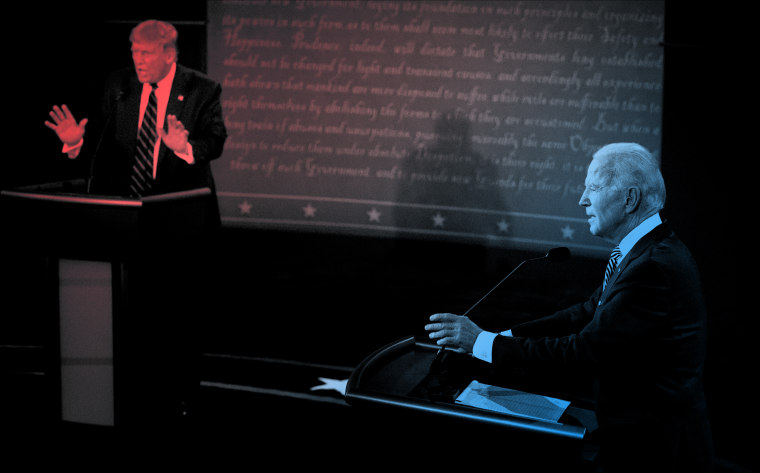WASHINGTON — The first debate between President Donald Trump and Joe Biden was a slugfest led by the president's incessant interruptions and misinformation, with scattered moments of substantive discussion.
The showdown, hosted in Cleveland by Chris Wallace of Fox News, came as Biden, the Democratic nominee, led Trump by 8.1 percentage points in the NBC News National Polling Average.
It was unclear that Trump made up ground in an evening during which he put his brash and petulant style on full display, with the apparent intention of appearing dominant and making Biden look weak. Trump's approach to date has hemorrhaged support among seniors, suburban women and white college graduates, and those constituencies are likely to decide the election.
Here are four takeaways from the evening:
Trump's interruptions, Biden's clapbacks
The president came out swinging, with constant interruptions and attempts to throw Biden off-balance, primarily with frequent attacks on his son Hunter, which threw the debate off track and eventually sparked pushback from Wallace to let his rival speak.
Biden didn't shrink from the moment, repeatedly knocking Trump as a "clown" and a "liar" who wouldn't stop "yapping," responding with an antagonistic smile and once telling him to "shut up." He repeatedly defended his son and dismissed Trump's claims as having been discredited. Biden also tried to rattle Trump by mocking his past remarks proposing the injection of bleach to combat the coronavirus and nuking hurricanes to short-circuit storms.
First-term presidents tend to perform poorly in first debates, out of practice at being on the same footing with an opponent. It was clear that Trump is used to being able to control the conversation, which he repeatedly tried to do.
Trump doesn't condemn white supremacists
In a debate during which Biden called Trump a "racist" to his face, one of the most significant moments came when Wallace asked the president whether he was willing to condemn white supremacists and "militia" groups.
Trump appeared irritated and demanded to know whom he was being asked to condemn. When Wallace mentioned the neo-fascist Proud Boys, Trump said: "Proud Boys, stand back and stand by. But I'll tell you what. Somebody's got to do something about antifa and the left. Because this is not a right-wing problem."
As Trump later faced condemnation on cable news and social media for his comments, the Proud Boys celebrated his response.
Appearing on CNN after the debate, former Sen. Rick Santorum, R-Pa., said Wallace knew the question was a trap for Trump because the president doesn't like to "say something bad about people who support him." Santorum called Trump's response a gaffe that hurt him.
A clash over the economy
Throughout the debate, Trump sprinkled in attacks on Biden for having spent four decades in public office and having failed to fix many of the problems he now says he's running for president to tackle. "The people understand, Joe — 47 years. You have done nothing," the president said.
At one point, the tactic sparked a flash of exasperation from Biden. "You're the worst president America has ever had," he said. "Come on."
It was part of Trump's playbook to paint Biden as a do-nothing politician, and he made his case on the economy, the one top-tier issue on which the president maintains an edge in polls. He misleadingly claimed that Biden is determined to shut down the country again.
"We built the greatest economy in history. We closed it down because of the China plague," Trump said. "He will shut it down again. He will destroy this country."
Biden responded by saying the U.S. "can't fix the economy until you fix the Covid crisis." He said Trump benefited from the Obama-Biden administration's economic record: "We handed him a booming economy. He blew it."
Biden shivs the left
Biden did his best to distance himself from the left throughout the debate. He repeatedly denounced the Green New Deal — "no, I don't support the Green New Deal," he said — and referred instead to his own climate plan, which includes less aggressive emission-reduction targets.
Early on, Biden said that he was "not opposed to" Trump's Supreme Court pick, Amy Coney Barrett, and that she "seems like a very fine person" before criticizing her past remarks about the legality of the Affordable Care Act and saying American voters should decide who picks the next justice. He punted when asked whether he supports the progressive push to expand the Supreme Court.
Biden also went out of his way to make it clear that he opposes calls from some left-wing activists to "defund the police," and he disputed a false claim from Trump that he supports "Medicare for All," noting that he defeated its leading proponent, Bernie Sanders, in the primaries.
The remarks reflected Biden's larger strategy, which is not to bet the election on turning out young and progressive voters but rather to bring seniors and college-educated whites with more moderate views into his coalition.
While it foreshadows governing tension with progressives if he's elected, the strategy has been paying off electorally, if the polls are correct, with Election Day just 35 days away.

